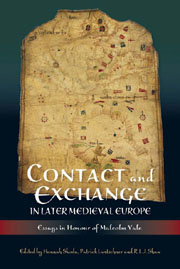Book contents
- Frontmatter
- Contents
- List of Illustrations
- List of Contributors
- Acknowledgements
- The Work of Malcolm Vale
- Principal Bibliography of Malcolm Vale
- Introduction
- Part I Boundaries and Units
- Part II Practices of Exchange
- Introduction
- In and Out of Africa: Iberian Courts and the Afro-Portuguese Olifant of the Late 1400s
- The Knowledge and Use of the ‘Teachings of Saint Louis’ in Fourteenth-Century England
- Philip of Chieti in Flanders, 1303–1305
- The Last Week of the Life of Edward the Black Prince
- Tournament Culture in the Low Countries and England
- Conclusions
- Index
- Tabula Gratulatoria
The Knowledge and Use of the ‘Teachings of Saint Louis’ in Fourteenth-Century England
from Part II - Practices of Exchange
Published online by Cambridge University Press: 05 February 2013
- Frontmatter
- Contents
- List of Illustrations
- List of Contributors
- Acknowledgements
- The Work of Malcolm Vale
- Principal Bibliography of Malcolm Vale
- Introduction
- Part I Boundaries and Units
- Part II Practices of Exchange
- Introduction
- In and Out of Africa: Iberian Courts and the Afro-Portuguese Olifant of the Late 1400s
- The Knowledge and Use of the ‘Teachings of Saint Louis’ in Fourteenth-Century England
- Philip of Chieti in Flanders, 1303–1305
- The Last Week of the Life of Edward the Black Prince
- Tournament Culture in the Low Countries and England
- Conclusions
- Index
- Tabula Gratulatoria
Summary
The reign of Louis IX (1226–70) was marked by an ambitious policy of reform within the French kingdom as well as by a number of significant initiatives in the context of relations with the other European states – illustrated by Louis as a king of peace – and the Muslim world, in particular the renewal of the crusade. Louis also deliberately cultivated an image close to contemporary models of sanctity. After the death of the king at Tunis, this image was taken up and developed by several authors in the context of the procedure that eventually led to his canonisation in August 1297 and then as part of the policy of ideological reinforcement of the French monarchy at the turn of the century.
The ‘Teachings’ that Saint Louis delivered for the sake of his heir and successor Philippe hold a significant place in this construct. This famous text contains prescriptions concerning the spiritual life of the prince – including the choice of his confessors –, his moral behaviour, the protection he ought to give the Church, the company he must keep, his duty of obedience to the pope. Other articles deal more specifically with the government of the kingdom: the king should cut the expenditure of his household and control his agents, he should not wage unjust wars and, if he must go to war, he should limit the impact of military action on populations. Also, he ought to be a just and merciful judge, he should redress all wrongs (even if the decision is not favourable to him), and outlaw blasphemy and heresy in his kingdom.
- Type
- Chapter
- Information
- Contact and Exchange in Later Medieval EuropeEssays in Honour of Malcolm Vale, pp. 189 - 210Publisher: Boydell & BrewerPrint publication year: 2012



